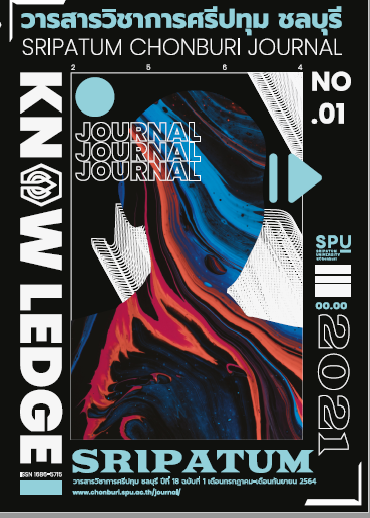THE CHALLENGE OF DIFFERENTIATED INSTRUCTION IN THAILAND
Keywords:
differentiated instruction, student-centered learningAbstract
The purpose of this article are to study the concept and model of Differentiated Instruction (DI) Nowadays, the world today is changing and developing in many ways rapidly and all the time, whether it is technology, lifestyle, and environment, etc. Therefore, people do not have to wait for things like in the past because we can access various knowledge by yourself easily at anytime and anywhere. In addition, various changes also allow people to express themselves in a clear and diverse way. Also, it affects instructional system that needs to be developed in response to student-centered learning. Differentiated Instruction (DI) is another method that has been adopted and recognized for responding well to the needs of different learners in a class. New Zealand is regarded as one of the best education in the world which has applied DI effectively and efficiently. Thailand has started to adopt this learning and teaching management but it is not widely used. Therefore, it is a challenge to Thai teachers to start planning and implementing DI in order to develop learners’ skills and knowledge to meet their needs, interests, and the achievement they expected.
References
พ.ศ. 2545 พร้อมกฎกระทรวงที่เกี่ยวข้อง และพระราชบัญญัติการศึกษาภาคบังคับ พ.ศ. 2545.
กรุงเทพฯ: โรงพิมพ์องค์การรับส่งสินค้าและพัสดุภัณฑ์ (ร.ส.พ.).
มาเรียม นิลพันธุ์, ศิริวรรณ วณิชวัฒนวรชัย และอธิกมาส มากจุ้ย. (2556). การพัฒนานวัตกรรมการจัดการเรียน
การสอนที่เน้นความแตกต่างระหว่างบุคคล. วารสารมหาวิทยาลัยศิลปากร, 33(2), หน้า 83-105.
สุทธิดา บุญทวี, สิทธิกร สุมาลี และวิภารัตน์ แสงจันทร์. (2559). นิวซีแลนด์กับระบบการประเมินที่สอดคล้อง
กับความต้องการของนักเรียนระดับมัธยมศึกษา. นิตยสาร สสวท., 45(203), หน้า 35-39.
สุรเชษฐ์ ตรรกโชติ. (ม.ป.ป.). การเรียนรู้ที่อยู่ร่วมกับความแตกต่าง (ออนไลน์). เข้าถึงได้จาก:
https://www.educathai.com/knowledge/articles/399 [2563, 12 ธันวาคม].
อติยศ สรรคบุรานุรักษ์ และศศิณัฎฐ์ สรรคบุรานุรักษ์. (2558). การจัดการเรียนการสอนที่เน้นความแตกต่าง
ระหว่างบุคคล. วารสารศึกษาศาสตร์มหาวิทยาลัยศิลปากร, 12(1-2), หน้า 39-48.
Delisle, James R. (2015). Differentiation doesn’t work (Online). Available:
https://www.edweek.org/ew/articles/2015/01/07/differentiation-doesnt-work.html [2021, July 5].
Fox, Jenifer, & Hoffman, Whitney. (2011). The differentiated instruction: Book of lists. Oxford, UK:
Jossey-Bass.
Gregory, Gayle H., & Kuzmich, Linda M. (2004). Data driven differentiation in the standards-based
classroom. Thousand Oaks, CA: Corwin.
Guild, Pat Burke. (2001). Diversity, learning style and culture (Online). Available:
http://www.newhorizons.org/strategies/styles.guild.ht [2021, July 5].
James, Dianne. (2009). Differentiated instruction: One school’s survey analysis. The Corinthian, 10(13),
pp. 169-191.
Kimball, Jake. (2009). Differentiated instruction. The English Connection, 13(1), p. 20.
Kotob, Mazen, & Arnouss, Doha. (2019). Differentiated instruction: The effect on learner’s achievement in
kindergarten. International Journal of Contemporary Education, 2(2), p. 61.
Mavidou, Anastasia, & Kakana, Domna Mika. (2019). Differentiated instruction in practice: Curriculum
adjustments in kindergarten. Creative Education, 10(3), pp. 535-554.
Ministry of Education. (n.d.). The New Zealand curriculum (Online). Available:
https://nzcurriculum.tki.org.nz/Principles [2021, July 5].
Stephen, Joseph, et al. (2013). The impact of differentiated instruction in a teacher education setting:
Successes and challenges. International Journal of Higher Education, 2(3), pp. 28-40.
Subban, Pearl K., & Round, Penny N. (2015). Differentiated instruction at work. Reinforcing the art of
classroom observation through the creation of a checklist for beginning and pre-service teachers.
Australian Journal of Teacher Education, 40(5), pp. 116-131.
Tapper, Nicholas, & Horsley, Jenny Kairaranga. (2017). Differentiation in the secondary school classroom.
Kairaranga, 18(2), pp. 40-46.
Theisen, Tony. (2002). Differentiated instruction in the foreign language classroom: Meeting the diverse
needs of all learners. The Communique, 6, pp. 1-8.
Timperley, Le Fevre. (2019). Professional conversations to develop adaptive expertise (Online). Available:
https://noiie.ca/wp-content/uploads/2019/07/Helen-Timperley-full-sym.pdf [2021, April 23].
Tomlinson, Caroll Ann. (1999). The differentiated classroom: Responding to the needs of all learners.
Alexandria, VA: Association for Supervision and Curriculum Development.
Tomlinson, Caroll Ann. (2001). How to differentiate instruction in mixed-ability classrooms. Upper Saddle River, NJ:
Pearson Education.
Tomlinson, Caroll Ann. (2005). How to differentiate instruction in mixed-ability classrooms. Alexandria, VA:
Association for Supervision and Curriculum Development.
Tomlinson, Caroll Ann. (2017). How to differentiate instruction in academically diverse classrooms (3rd. ed.). Alexandria, VA: ASCD.
Tomlinson, Caroll Ann, & Allan, Susan Demirsky. (2000). Leadership for differentiating schools &
classrooms. Alexandria, VA: Association for Supervision and Curriculum Development.
Tomlinson, Caroll Ann, & Eidson, Caroline Cunningham. (2003). Differentiation in practice: A resource
guide for differentiating curriculum grades 5-9. Alexandria, VA: Association for Supervision and
Curriculum Development.
Tomlinson, Caroll Ann, & Moon, Tonya R. (2013). Assessment and student success in a differentiated classroom. Alexandria, VA: ASCD.
Wilson, Suzanne M., & Peterson, Penelope L. (2006). Theories of learning and teaching: What do they
mean for educators?. Washington, DC: National Education Association.
Downloads
Published
Issue
Section
License
บทความทุกบทความเป็นลิขสิทธิ์ของวารสารวิชาการศรีปทุม ชลบุรี



